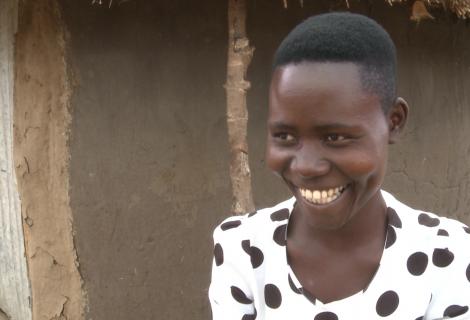Strengthening Community livelihood Resilience and climate change.

Mary Naigo's success story.
When we talk about organic farming in Uganda, there is a belief that growth can only equal crisis. Katakwi District has been dubbed a disaster-prone area with floods, drought and desert locusts invading the District. This has been linked to use of pesticides and the land degradation, which have affected the food productivity and food security for thousands across the District.
The District experienced one of the worst floods in 2019 with many areas getting cut off during flooding and resulting in loss of livelihoods, limited access to basic social services and markets. The result was that 143,000 people were left vulnerable amidst challenges of hunger, high disease burden, and poverty.
ActionAid Uganda, through the International Humanitarian Team (iHART) intervened by providing quick relief and soon after the disaster, more sustainable support through resilient livelihoods training and provision of locally available and replant-able groundnut seed. The partnership saw to the end, training of 30 farmers on livelihood resilience and food security amidst climate shocks. The trained farmers as a result, adopted climate resilient and sustainable agricultural practices such as Organic pesticide making and application, effectively controlling the endemic pests in horticulture production.
From 25kilograms of the groundnuts distributed and planted, the farmers realized a 200Kgs harvest, as a result of applying organic manure. The selection of an indigenous variety of groundnuts (Groundnut Rosette Virus, leaf spot and Aphids) was deliberate by the farmers who attributed it to its resistance to pests and diseases, drought tolerance and high price compared to improved varieties and the high oil content which was needed to improve nutrition among pregnant women and children.
Mary Naigo was one of the 30 community members from Palam subcounty in Katakwi district who benefited from the distribution of local groundnut seed meant to cushion them from the shocks of food insecurity whilst assisting them to build resilient and sustainable livelihoods especially during such prevalent disasters in the district.
Mary reaped a good harvest from the groundnuts and sold to start another business, making and selling samosas. “I feel that this support is heaven sent, I sold groundnuts and started this business which allows me earn income to provide for my family.” she says.
To address unavailability and high costs of seed during the lock down, farmers established a community managed seed bank to preserve, conserve and multiply indigenous seeds. This enabled farmers to continue farming amidst the COVID-19 pandemic.
“We are grateful for the support from ActionAid, my group members no longer spend money buying inorganic pesticides, fertilizers and seeds from the market. We can now make our own organic pesticides, fertilizers, preserve our seed and conserve the environment.” Osele Emmanuel, Farm Manager-Osudio-aipecitoi farmers group, Katakwi District, Eastern Uganda.